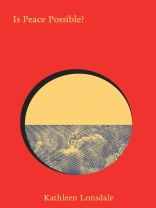Marginalian Editions presents a trailblazing Quaker scientist’s slender masterwork of moral courage, penned at the height of the Cold War, envisioning a transformation of the human spirit and our politics that might enable the triumph of peace.
Kathleen Lonsdale was a groundbreaking chemist who was instrumental in developing the science of crystallography. She was also a midlife convert to Quakerism who campaigned for peace and prison reform. Horrified by the dropping of the first atomic bombs, Lonsdale felt that the entire scientific community was now tainted by the violence it had enabled. Published in 1957, Is Peace Possible? was her attempt to make amends for this communal guilt by demonstrating that science can bring peace as well as war, and can address the “big questions” generally left to the humanities.
In crystalline language and logic honed from a lifetime of relying on the sharpness of her mind to cut through barriers of class and gender, and refusing to be bullied by received wisdom about war’s inevitability, Kathleen Lonsdale’s Is Peace Possible? is a work of quiet, elegant sanity. It is a snapshot of a particular moment in history, but its themes are eternally relevant, and perhaps even more necessary now than when it was written.
Mengenai Pengarang
Maria Popova is the creator of The Marginalian (born in 2006 under the outgrown name Brain Pickings), which is included in the Library of Congress permanent digital archive of culturally valuable materials, author of Figuring, editor of A Velocity of Being: Letters to a Young Reader, and maker of The Universe in Verse—a charitable celebration of the wonder of reality through stories of science winged with poetry.












